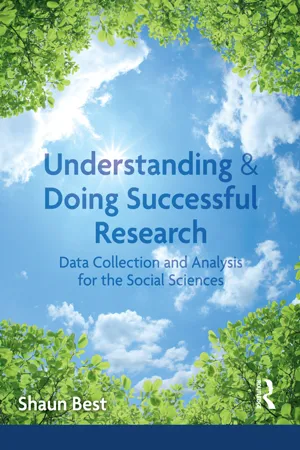Psychology
Ethics and Socially Sensitive Research
Ethics in socially sensitive research involves considering the potential impact of research on vulnerable or marginalized populations. This includes ensuring informed consent, protecting confidentiality, and minimizing harm. Researchers must also be mindful of power dynamics and biases that may influence their work, and strive to conduct research that is respectful, fair, and beneficial to the communities involved.
Written by Perlego with AI-assistance
7 Key excerpts on "Ethics and Socially Sensitive Research"
Learn about this page
Index pages curate the most relevant extracts from our library of academic textbooks. They’ve been created using an in-house natural language model (NLM), each adding context and meaning to key research topics.
- eBook - ePub
- Hennie R Boeije(Author)
- 2009(Publication Date)
- SAGE Publications Ltd(Publisher)
When the researcher manages to win and does not belie the trust of the participants, they may be willing to say or show more than they had planned to. In particular, interviewees get into a ‘telling’ mode in which they find it embarrassing or inappropriate to refuse to answer certain questions or elaborate on certain matters. That is how interviewees are socialized and it is after all what researchers try to accomplish by creating a pleasurable atmosphere while generating data. Although trust can increase openness in participants, there can be danger in it as well. Although openness can be fortuitous for researchers, they have a moral obligation to protect individuals from saying more than they want. A colleague researcher took this very literally by offering the children in her interview study a stop sign that they could raise when they did not want to talk any further. None of the children actually used the sign, but it gave them control over what they wanted to reveal.Ethics in social science research is a broad topic. In this section we first look at the common ethical principles associated with ethical research. We address the professional codes and institutions that have been established with regard to ethical issues. Next, we turn to the relationship between ethical issues and studying sensitive topics, as research subjects in qualitative research are often sensitive. Further on, we discuss balancing harm and benefits for the people taking part in qualitative research, as well as possible stress for the researchers themselves. We finish with narrowing down the subject to the ethical aspects of data analysis.Ethical principles
Despite different accents in the available valid frameworks that guide ethical choices, there are common principles as well (Miles & Huberman, 1994). Beneficence is considered an umbrella principle that refers to maximizing good outcomes for science, humanity, and the individual research participants while avoiding or minimizing unnecessary harm, risk or wrong (Sieber, 1992). This general principle needs translation to be of practical relevance, which is usually addressed in three dimensions, namely informed consent, privacy and confidentiality and anonymity. - eBook - ePub
Laboratory Psychology
A Beginner's Guide
- Julia Nunn, Julia Nunn(Authors)
- 2018(Publication Date)
- Psychology Press(Publisher)
It is also worth pointing out, as Korchin and Cowan (1982) have noted, that the validity of scientific work and its ethical status are intertwined. Unethical practice can reduce the external validity of the research if it results in research methods that cannot be translated into practice. On the other hand, research that is poorly designed can reduce the ethical standing of the research, because the potential scientific benefits that can accrue are often minimal, and therefore less likely to offset possible risks to the participants. So good ethical practice makes for better science.SUMMARYBy now you should:- be aware of what an ethical problem is;
- appreciate how ethical problems can arise;
- understand how science and ethics are related;
- be viewing ethical dilemmas as a challenge!
The rise of ethical concerns in psychological research
In the past few decades, ethical issues in the social sciences have become a topic of growing concern as researchers try simultaneously to produce valid scientific work and protect the welfare of their participants. An index of this rising concern is the number of ethical guidelines that have sprung up in an attempt to codify ethical behaviour. But why has this concern only been expressed recently? In the 1960s discussions about the ethical implications of social science were rare, despite the fact that experiments involving deception, privacy invasion, and threats to confidentiality were accepted as a valid way of conducting such research. Kimmel (1988) suggests that the discussion of ethical practices at that time was taken as an indication that one had not yet outgrown a pre-scientific nature, bringing into the scientific domain issues that did not belong there. Hopefully very few researchers still hold this view!An outline of some of the important developments that led to a change of viewpoint and, in turn, to a rise of ethical concerns in psychological research appears next.One of the earliest influences was that of World War II. Psychologists were called on during this time to devise a number of testing programmes, including the intelligence testing of thousands of recruits. When the war ended, the demand for these kinds of tests in civilian settings, such as personnel, accelerated. This gave rise to questions about privacy, confidentiality, and the misuse of test results that may not have seemed pertinent to the war effort. Thus the call for a code of ethics seems to have come about at least in part as a result of the application of psychology. Diener and Crandall (1978) suggest that the emergence of applied psychology destroyed the notion that research was invariably ethical and value-free. - eBook - ePub
Successful Research Projects
A Step-by-Step Guide
- Bernard C. Beins(Author)
- 2013(Publication Date)
- SAGE Publications, Inc(Publisher)
Chapter 3
Acting Ethically in Your Research
In this chapter you will learn about…- Ethical Principles and Standards of the American Psychological Association
- Federal Regulations in the United States
- Important Ethical Issues in Psychological Research
- Preparing for Evaluation by Your Institutional Review Board
- Commonly Requested Information for IRB Proposals
M ost people, researchers included, act responsibly and ethically most of the time. Nonetheless, there have been enough instances of questionable research in the past century that governments have found it necessary to establish formal guidelines and to pass laws regulating research.Most of the famous instances of ethically troublesome research have not involved psychology. The two psychological cases frequently cited are Stanley Milgram’s obedience studies (Milgram, 1974) and Philip Zimbardo’s prison studies (Zimbardo, 1973). The American Psychological Association (APA) actually investigated Milgram regarding the ethics of his research when he applied to become a member. APA concluded that Milgram had not committed ethical breaches.Both of these famous cases occurred about four decades ago. It is hard to believe that there have been no serious cases hidden within the psychological literature since then, but if you look in psychology journals, you will see that most research is fairly benign with respect to potential harm to participants or subjects.Ethical Principles and Standards of the American Psychological Association
APA first developed ethical principles for its members over half a century ago (American Psychological Association, 1953). The ethics code has undergone periodic revision several times since then, with a revision in 2002 (American Psychological Association, 2002) and an update in 2010 (2010 Amendments, 2010). The Code of Conduct in its entirety is available online at www.apa.org/ethics/code/index.aspx - eBook - ePub
AQA Psychology A Level Paper Three: Issues and Debates
Issues and Debates
- Phil Gorman(Author)
- 2020(Publication Date)
- Routledge(Publisher)
Chapter 8 Ethical implications of research studies and theory Spec check Ethical implications of research studies and theory - including reference to social sensitivity. AO1 (Knowledge and understanding): Ethical implications. What effect do research and theory have on those involved in research and society in general? Ethical implications Today, more than ever, the need for participants to be protected from the negative impact of taking part in some form of study is very clear. The impact of taking part in reality TV programmes or controversial chat shows has brought home to everyone the need for some form of consideration for the participants. As has already been seen we have ethical guidelines in order to deal with the ethical issues that arise during psychological research. Ethical guidelines are codes of conduct that have been developed to help psychological researchers ensure that neither the participants in the research nor the credibility of psychology are damaged during the course of research. We cannot simply absolve ourselves from the negative impact on participants, nor can we simply argue that it’s all OK because at the end everyone will be debriefed and that will sort it all out. In the past, on TV programmes and in psychological studies, it has been argued that all of the participants were checked up on and were found to have suffered no long-term ill effects, and this has been used as a kind of security blanket for everyone involved to cling on to. Meanwhile, people’s lives have been destroyed (or ended) while producers and researchers are consoling themselves that ‘they did the right thing’. The implications of research are concerned with the wider and longer-term impact of research and theory - eBook - ePub
Understanding and Doing Successful Research
Data Collection and Analysis for the Social Sciences
- Shaun Best(Author)
- 2014(Publication Date)
- Routledge(Publisher)
et al. (2003) suggest many researchers habitually view the process of ethical approval more as a bureaucratic hurdle to be overcome, rather than as a positive or helpful part of the research process.In social research there will always be disagreements about whether an issue is morally relevant and it for this reason that ethical codes of practice have developed to guide researchers on the correct and appropriate stance to take. As a social researcher you need to include an ethical statement in your research report. In this statement you need to explain if you have attempted to gain the informed consent of the respondents and what steps you have taken to achieve this.Lindsay (2000) argues that codes of research ethics place a much greater emphasis on some features of the research process than others. The emphasis tends to be in relation to access to the respondents, selection of the respondents, their consent, anonymity and confidentiality.Other key concepts in the field of research ethics also include:- Veracity – as researchers we should be moral exemplars who strive to be honest and truthful. As researchers we should not deceive respondents about our research. In addition we should handle the information we are given from respondents in the research process sensitively.
- Non-malfeasance – in other words, to do no harm, to be fair and to have the welfare of the respondent in mind at all times (beneficence).
In summary, all research practice requires an awareness of ethical issues. In ethnographic and other forms of qualitative research ethical issues often emerge during the data collection phase and ethnographers often struggle to meet the ethical requirements that professional bodies have developed for good research practice. As researchers we should not tell lies about the research and we should handle the information we are given from respondents in the research process sensitively. - eBook - ePub
Research Methods and Society
Foundations of Social Inquiry
- Linda Eberst Dorsten, Lawrence Hotchkiss(Authors)
- 2018(Publication Date)
- Routledge(Publisher)
Chapter 2Ethics and Social Science Research
Looking at How the Social World Works
Most social research is comparatively benign—but not all of it is. For example, a well-known study conducted experiments in which the researcher had subjects administer fake electric shocks to persons (“confederates”) who knew that the shocks were fakes but were told to pretend otherwise (Milgram, 1974). Subjects were told the shocks were absolutely necessary to motivate the confederates to learn. Many subjects, despite personal reservations, raised the shocks to “dangerous” levels even while the confederates winced and screamed. Understanding the psychology of Nazism was the motivation for the study.You might be able to locate an online video of the Milgram experiment. Today, using the fake electric shocks would not meet requirements for research with human subjects.Figure 2.1 “Rules of action or conduct”Source: iStock: Tashatuvango, 2017It is essential to understand ethics before you begin to develop any research project that includes persons, as well as how to avoid doing any harm. This chapter gives you an opportunity to obtain basic information about ethical issues involved in developing, conducting, and evaluating research with human subjects before beginning work in the following chapters—and before beginning your future career!Goals of This Chapter
Attention to the treatment of human subjects has intensified in recent years. If you or a family member have sought medical care in the U.S. during the last few years you are probably familiar with HIPAA. The 1996 HIPAA Privacy Rule establishes national standards to protect individuals’ medical records and other personal health.To guide U.S. research, the 1974 National Research Act created the National Commission for the Protection of Human Subjects, since 1978, called the National Commission for the Protection of Human Subjects of Biomedical and Behavioral Research. The Commission was charged with establishing protections that must be afforded to human subjects. The United States, United Kingdom (U.K.), and Canadian human subjects policies are reviewed later in this chapter. - eBook - ePub
- Joseph W. Check, Russell K. Schutt(Authors)
- 2011(Publication Date)
- SAGE Publications, Inc(Publisher)
Chapter 3 Ethics in ResearchResearch Question: How Do We Conduct Research Validly and Ethically?Chapter Contents
- Historical Background
- Ethical Principles
Imagine this: One spring morning as you are drinking coffee and reading the newspaper, you notice a small ad for a psychology experiment at the local university.“Earn money and learn about yourself,” it continues. Feeling a bit bored, you call and schedule an evening visit to the lab. You are about to enter one of the most ethically controversial experiments in the history of social science.WE WILL PAY YOU $45 FOR ONE HOUR OF YOUR TIMEPersons Needed for a Study of MemoryYou arrive at the assigned room at the university, ready for an interesting hour or so, and are immediately impressed by the elegance of the building and the professional appearance of the personnel. In the waiting room, you see a man dressed in a lab technician's coat talking to another visitor—a middle-aged fellow dressed in casual attire. The man in the lab coat turns and introduces himself and explains that as a psychologist, he is interested in whether people learn things better when they are punished for making a mistake. He quickly convinces you that this is a very important question for which there has been no adequate answer; he then explains that his experiment on punishment and learning will help answer this question. Then he announces, “I'm going to ask one of you to be the teacher here tonight and the other one to be the learner.”






